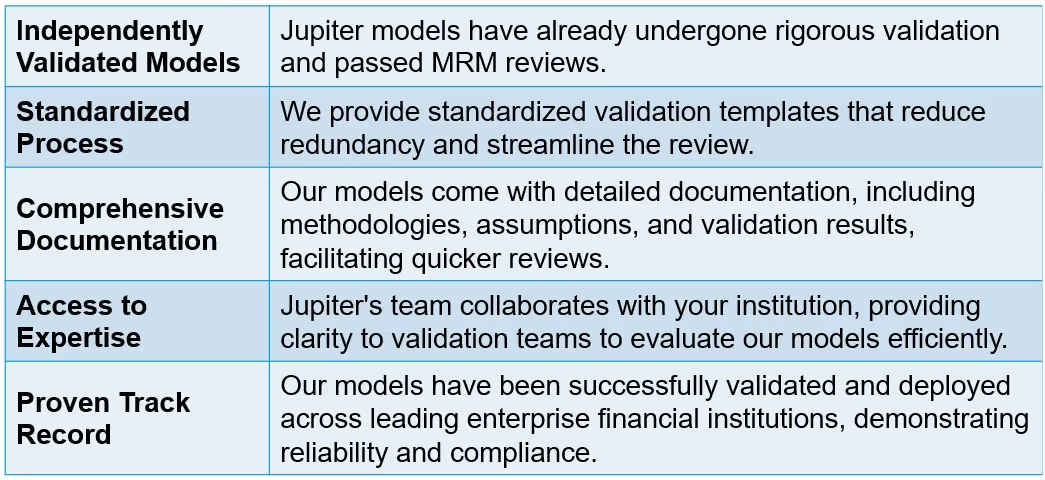
As you await MRM approval, competitors who have actionable climate data are already moving on the limited remaining climate-resilient investment opportunities.

High Standards, High Stakes: The Double-Edged Sword of Model Risk Management
Financial institutions are increasingly aware of the strategic advantages of integrating climate risk data into their decision-making processes. From stress testing to portfolio optimization, the applications are vast. However, the rigorous MRM processes designed to ensure model reliability and compliance means institutions must delay the deployment of these models in production environments until MRM is completed.
Failing MRM review can have even worse consequences – significant delays due to restarting processes or finding new third parties or vendors to satisfy requirements.
Delays aren't merely a procedural hiccup; they’re a strategic setback. As internal stakeholders await MRM approval, competitors who have actionable climate data are already leveraging it to inform lending decisions, identify investment opportunities, and enhance risk assessments.
The Cost of Delay: Missed Opportunities and Competitive Disadvantage
Jupiter has worked with companies who put other climate risk models through MRM and watched them fail, resulting in 12-24 months of lost resources, time, and expenses. Delays in model validation translate directly into missed business opportunities and have negative downstream consequences:
- Inhibited Product Innovation: Without validated models, institutions will not be able to develop revenue-generating climate-linked financial products, such as green bonds or sustainability-linked loans, missing out on burgeoning markets.
- Regulatory Risks: As regulators increasingly mandate climate risk disclosures, institutions without validated models may find themselves non-compliant, facing potential fines and reputational damage.
- Investor Confidence: Stakeholders are demanding transparency in climate risk management. Institutions unable to demonstrate robust, validated models may lose investor trust.
- Operational Inefficiencies: Prolonged validation processes consume resources and divert attention from strategic initiatives, leading to increased operational costs.
- Lagging in the Race for Finite Opportunities: As the pool of climate-resilient assets shrinks, institutions with faster validation cycles are first to act – securing investments that may no longer be available by the time slower peers are ready to move.
The Solution: Cross-functional Adoption of a Single Source of Truth
Capitalizing on these opportunities requires widespread adoption of rigorously vetted climate data. And large-scale adoption won’t happen with models that get stuck in validation, or completely fail. In order to adopt, your teams are looking for:
Sophistication: Data that meets the rigorous criteria required by banking professionals, investors, regulators and other stakeholders.
Speed: Data that moves through the MRM process quickly and efficiently with less resource drain on your modeling teams.
Standardization: Your teams want to work with colleagues who are all using the same validated source of truth, effortlessly compare results across business units, and roll them up into a cohesive enterprise view.
Reliability: Data that has already passed the scrutiny of enterprise-grade model validation engenders confidence in your teams that they’re on the right track.
Introducing Jupiter's MRM Accelerator
Recognizing the challenges institutions face, Jupiter offers the MRM Accelerator — a comprehensive solution designed to expedite the validation and deployment of climate risk models.

Seizing the Climate Opportunity
The integration of climate risk data into financial decision-making is no longer optional — it's imperative. Institutions that proactively streamline their MRM processes position themselves to seize emerging opportunities, meet regulatory expectations, and build investor confidence.
By leveraging solutions like Jupiter's MRM Accelerator, financial institutions can transform climate risk from a compliance challenge into a strategic advantage.
Contact Jupiter
If you would like to speak directly with a climate risk expert, contact us today and request a demo.
.webp)
